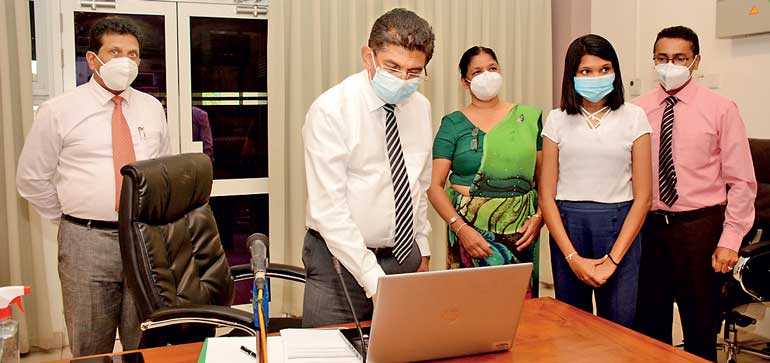Monday Feb 23, 2026
Monday Feb 23, 2026
Tuesday, 20 April 2021 00:00 - - {{hitsCtrl.values.hits}}

Ministry of Environment Secretary Dr. Anil Jasinghe launches the Sri Lanka Biosafety Clearing House website. Others (from left): Ministry of Environment Additional Secretary – Environment Development Dr. Sunimal Jayathunga, Ministry of Environment Director – Biodiversity Secretariat and National Project Director – Biosafety Project Pathma Abeykoon, Sri Lanka Biosafety Clearing House National Consultant Dr. Maheshi Atapattu, and FAO National Project Manager – Biosafety Project Shanaka Gunawardena
Sri Lanka has been a party to the Cartagena Protocol on Biosafety (CPB) since year 2000 and has committed towards ensuring biosafety in the country. Countries which are parties to the CPB must adhere to this international agreement ensuring the safe handling, transport and use of living modified organisms (LMOs) also known as GM organisms (GMOs) resulting from modern biotechnology that may have adverse effects on biological diversity and human health.
The National Biosafety Framework (NBF) and the National Policy on Biosafety, both of which were approved by the cabinet of ministers in 2005 demonstrate the proactive approach taken by the government of Sri Lanka. Further, drafting of a specific law to deal with GMOs was definitely an important step towards fulfilling the obligations under the CPB.
However, Sri Lanka was in need of technical support towards strengthening regulatory, institutional and technical capacities for the effective implementation of the NBF in conformity with the CPB. To fulfil this need, the Ministry of Environment (MoE) as the focal point to the CPB is implementing the National Biosafety Project ‘Implementation of the National Biosafety Framework in accordance with the Cartagena Protocol on Biosafety’ with funding from the Global Environment Facility (GEF) and technical support from the Food and Agriculture Organization of the United Nations (FAO).
The National Biosafety Project is, strengthening policy, institutional and regulatory frameworks for biosafety, enhancing the system for Risk Assessment, Risk Management and Risk Communication of GMOs, developing technical capacity for the detection and identification of GMOs and supporting knowledge development, public awareness, education and participation.
Public participation is integral for the implementation of the NBF. Article 23 of the CPB requires that the public must be consulted in the decision-making process regarding GMOs. “To make the public aware and get them to participate in decision-making, it is essential that a versatile portal of communication is established,” stated Ministry of Environment Director, Biodiversity Secretariat Pathma Abeykoon. “For informed decision making, it is important that accurate and reliable information on biosafety is available to the public,” reiterated Abeykoon. To fulfil this need, a specific website for biosafety in Sri Lanka titled the ‘Sri Lanka Biosafety Clearing House’ (BCH) was established by Ministry of Environment through the National Biosafety Project.
“Sri Lanka BCH, which is a tri-lingual website is a national resource fulfilling commitment to the CPB,” stated National Biosafety Project Manager Shanaka Gunawardena. “This has information related to biosafety in terms of authorities, regulations, guidelines, experts, databases of GMOs, risk assessment, awareness and whom to contact. Further, this provides linkage to the global BCH (http://bch.cbd.int/) and thus serves as a gateway to global information on biosafety.”
The Sri Lanka Biosafety Clearing House (http://lk.biosafetyclearinghouse.net/) was launched by the Secretary of the Ministry of Environment (MoE) in Colombo with the attendance (virtual and in-person) of key stakeholders. As stated by MoE Secretary Dr. Anil Jasainghe, “Launching of the Sri Lanka BCH demonstrates continuous commitment of Sri Lanka towards ensuring biosafety in the country.”